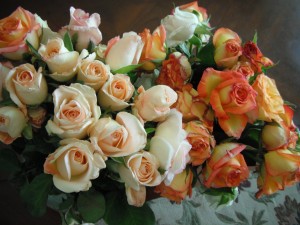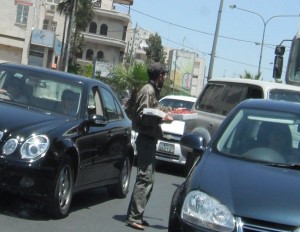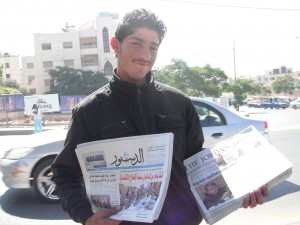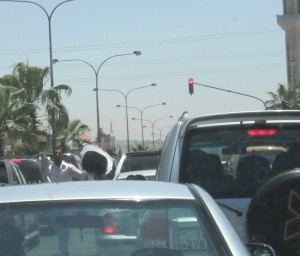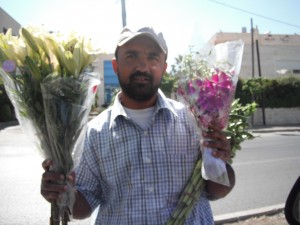Farewell My Flower Man
When I first moved to the Middle East, my family in the states were a bit worried. Not that I could blame them. But I was moving to Jordan! Jordan with its smiling King Abdullah who was a guest on The Jon Stewart show TWICE. So what if Jordan borders Iraq, Syria, Saudi Arabia, Palestine, and Israel, regions either beset by long wars or tackling protests? Jordan’s Queen Rania looks like a supermodel. Surely, I thought, I have nothing to fear.
When I arrived in Amman, I attended a security briefing at the American Embassy that taught me the correct embassy evacuation routes, how to shield myself when the “Duck and Cover” alarm is broadcasted across the sound system, and emphatically advised to never stick to a ‘routine’ in case someone decides I’d make a good kidnapping target. Then I was shown a series of grotesque photos of blown-up cars and blood-stained sidewalks whose only discernable value was to scare the hell out of me.
Very interesting, I thought to myself. I some took notes during the briefing, planning on somehow using the most shocking details in my writing, but otherwise I wouldn’t let myself get too freaked out.
However, I soon learned that there is one thing that could strike fear into the depths of my being, one thing that would keep me cowering in the safety of my house until there is absolutely no food left in the fridge, one thing that made me dread getting behind the wheel of my car and venturing out…
Street hawkers.
Each day I drive two miles to my daughter’s pre-school. Two miles that seem to have been designed by the roadside hawkers themselves, full of traffic lights and roomy medians where whole gangs of Jordanian youths wait until my car appears and then descend upon my geriatric Land Rover.
Paper boys are the worst.
There is one in particular, a diminutive young man who always wears a tight white and black striped shirt. My mental nickname for him is Toulouse-Lautrec because he seems half midget, half angry mime. He runs to my window and starts rapping on it, demanding my full attention, pressing his newspapers against the glass. When I try to wave him away, he removes what looks to be a coupon for diapers from his pocket, motions as if lifting a full spoon to his lips, and starts shouting “Baby!”
There is another paper boy, a handsome youth with gelled back hair, snug jeans, a ready smile, who salutes my car every time I pull up at that dreaded red light. I made the mistake of buying a newspaper from him one morning. The price is 500 fills, which I gave him. He looked at the change in his hand in disgust and told me I owed him the same amount again. I pointed at the price stamped on the paper, 500 fills in black and white print, and, surprised by my resistance to hand over more money, he quickly pulled out a coupon similar to the dwarf’s and started the hungry-baby routine with me. Call me crazy, but someone trying to coerce me, charmingly or not, doesn’t rate on experiences I’d like to repeat, so I haven’t bought a paper from him since.
Though I do have to admit a grudging respect for these men and the skill involved in these non-skilled jobs. These savvy traffic entrepreneurs know when those lights change as if their hearts beat in stop lights, stepping to the side just as red changes to green, dancing between the moving vehicles like fearless acrobats. I just wish the fearlessness didn’t extend to the window banging. I know that many people in Jordan have only seen Americans acting badly on television and therefore I want my behavior to reflect positively on all of my countrymen, so I usually try to seem as kind and generous and friendly as possible. I’m convinced I exude an American niceness even with the window up, the doors locked, shaking my head in a most definite NO. But this self-proclaimed American niceness only seems to incite more window banging, which I counteract with a feebly apologetic wince while staring straight ahead and praying the red light will turn green.
Here are some of the things I have seen sold in the middle of the very busy intersection: just about every fruit and vegetable, kites, angel wings, Dora posters, coloring books, chicklets (A LOT of chicklets- this seems to be the item of hawking choice for children, old men, and anyone who has a limp), reflector shades for your car, cowboy hats (yes, cowboy hats, more like caballero hats, I swear they even had tassels, and the only person I have ever seen wear these hats in all of Jordan is the guy who is unsuccessfully trying to sell them), strange little bobble headed chickens on a string, metal looking flowers that spin when the wind blows and seem capable of lobbing of the fingers of children, Jordanian flags, soccer flags revealing the strange Jordanian passion for Barcelona and Real Madrid, and flowers, flowers, flowers.
Flowers, indeed.
One day, in my vaguely smiling way of trying to not buy anything, a flower man ripped the bud off a rose and pointed at my child sitting in the back of my car. “Bebe! Bebe!” the man shouted. I reluctantly rolled down the window, he handed me the rose, and I thanked him. He did this for three days in his calm manner, to the point that my daughter would wave him down and expect some delicate bud. And that’s when I started buying his flowers. How can you not buy flowers from a man who gives them to your child? Who smiles at you? Who, miraculously, doesn’t bang on your window? Thus a relationship began, my buying his wares once or twice a week. For the first time in my middle class life, I had fresh flowers in my house every day. Flowers for NO REASON—not just the rare Valentine’s Day or anniversary bouquets from my husband. Incredible. Perhaps wasteful. But for an average of 4Jordanian Dinar (or $6 US), how could I resist not acting like a good American when here was this man smiling at me, waving at my daughter, passing cellophaned red roses through my window fresh and cool during the mid-afternoon sweltering heat?
And on this same intersection as my flower man, I found my ideal paper boy— a youth completely indifferent to making any kind of profit whatsoever. He leans against the cement divider and calmly watches the cars that pass, occasionally fanning himself with a newspaper. He only has an English paper on-hand to sell me about once a week, smiling and winding his right arm in a circle, claiming, “Bukra!” or tomorrow on the days he does not. Once a week suits me just fine. It takes me roughly that long to read a newspaper, nonfiction not being quite my thing, but a weekly paper keeps me just connected enough to world events that I can hold an intelligible conversation without sounding like a total idiot.
The last week of my daughter’s preschool, I bought flowers almost every day, full of guilt, not having the words in Arabic to tell my flower man that I would no longer be driving past him each morning and afternoon. I cherished each time he waved at me, each time he saw my car and came over with his arms full of color. I cherished that someone in this city recognized me, that I had established a connection with my limited words and gestures and wallet.
But now summer break has started. I have spent an entire week with my car languishing in the garage under my apartment building. My fresh flowers died, the vases have been washed and put away. Each day I go from my apartment to the embassy where my daughter plays in the shady park or swims in the jewel-like pool. Otherwise I try to hide. I do not want to drive down Hawker’s Lane and feel the pressure of being someone’s idea of an American. I do not want to think of what the paperboys who bang on my window see, this American woman safe her big car, with her long hair uncovered and her averted eyes, immune even to their desperate entreaties to feed real or imagined babies, all of us knowing that I have dinar in my pocket. That drive, even when I buy flowers or a newspaper, even when I buy a package of sun-warmed strawberries or a Jordanian flag for the dashboard, makes me feel like a lousy American, and I am happy to keep my guilty self at home.
But not to worry, reader. Every once and awhile I will brace myself and shop at that grocery store on my flower man’s street. I hope that he will still raise his arms when he sees my car in the distance, that he will still hand me velvety red roses, smile, and give single buds to my daughter in the backseat.
And when the summer is over, my daughter will start a new pre-K, with a new route to learn, new window bangers, new flower men, new paperboys weaving through traffic as newsprint flutters in the breeze. I will figure out my favorites and the ones whose eyes to avoid, and try to seem like a kind American with my windows rolled up, doors locked, unspent money weighing heavy in my purse.
